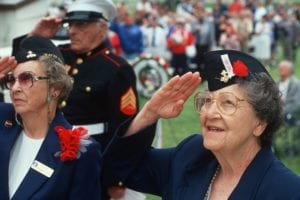
By Rosanne Rogé, CSA, RFG, CFP®
Managing Director
As a former Lieutenant in the U.S. Army Reserves, there is a special place in my heart for our wartime veterans. After all, the reason I have the freedom to write this article and do everything else I want to do is because of the sacrifices they made during time of war.
There is a little known and underutilized benefit for veterans known as the Aid-and-Attendance Benefit, which can help veterans pay for long term care or assisted living.
The Department of Veteran’s Affairs pays a maximum of $1,949 per month to married veterans who qualify. Single veterans and surviving spouses may also be eligible for smaller payments.
In order to qualify, veterans must have served at least 90 days of active military service, including one day during wartime, and have a discharge other than dishonorable from their branch of the military. Veterans are eligible if they served in WWI, WWII, Korea and Vietnam.
For those wartime veterans who entered active duty starting September 8, 1980, the eligibility requirements are a bit stricter. The Veteran must have served at least 24 months or the full period for which called or ordered to active duty. Those in Service from August 2, 1990 to present are also eligible for this benefit.
This is great news for those veterans and their families who may be in need of financial assistance either at home or in assisted living facilities, or who require other long-term care services. These benefits are tax-free to the recipient.
For 2017, the income limit for a couple is $25,525 ($21,531 for an individual or $13,836 for a veteran’s widow or widower). However, even though this number may sound low, a Veteran may still qualify if their income falls to that level after deducting any unreimbursed medical expenses, education expenses or expenses related to a last illness or burial of a dependent. Total liquid assets may not be more than $80,000 for a couple and $50,000 for a single veteran or the widowed spouse of a vet (this figure does not include a residence or automobile). These figures are starting guidelines and each case is determined individually by the claimant’s caseworker.
We advise utilizing the services of an attorney when applying for these benefits so that any eligibility for Medicaid is not disqualified. In addition, there is a requirement regarding the inability to perform the “activities of daily living,” such as bathing, eating, dressing, or being bedridden, blind or already living in an assisted living facility or nursing home due to mental or physical disabilities.
Those hoping to qualify can seek out free help through a regional, state or county-level Veterans office or go to www.va.gov. Then click on locations and then click on State Veteran Affairs offices or Regional Benefit offices. You can also view frequently asked questions and ask a question online with the Department of Veterans Affairs at https://iris.custhelp.va.gov/ or call them at 1-877-294-6380.
Please pass this information on to any veteran or family of a veteran that you know. It may just be the information they need to make their life a little easier.
To speak with a knowledgeable Senior Wealth Advisor regarding your financial future, please contact us at 631.218.0077.



